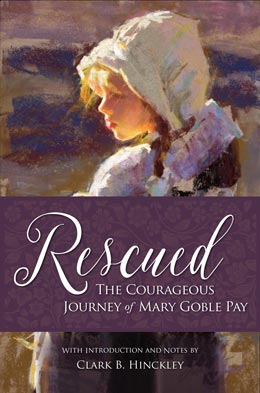Appendix 2
Letter from Mary Goble Pay to Samuel S. Jones, 18 October 1908
“Appendix 2: Letters from Mary Goble Pay to Samuel S. Jones, 18 October 1908,” in Rescued: The Courageous Journey of Mary Goble Pay, ed. Clark B. Hinckley (Provo, UT: Religious Studies Center, Brigham Young University; Salt Lake City: Deseret Book), 97‒100.
Transcription of a letter from Mary Goble Pay to Samuel Stephen Jones. Jones had been chairperson of the Handcart Veterans “Jubilee” celebration held in Salt Lake City on the 4th through the 6th of October 1906 and had requested information in preparation for another reunion of handcart veterans. The original letter is housed in the Church History Library (MS 11378, Handcart Veterans Association scrapbook, 1906–1914). Letter transcribed by Jay G. Burrup, 24 March 2006 (with punctuation added by the author).
Mr. S. S. Jones
Provo, Utah
Oct 18, 1908
Dear Bro.,
I will now try and send you a little of our history as you requested. My parents’ names were William and Mary Goble. There were 6 children: Mary, Edwin, Caroline, Harriet, James and Fanny. We left our home in Brighton, Sussex, England May 19, 1856. Came to London that day, the next to Liverpool. Went on board the ship Horizon that night. Sailed on the 25th. When we were in the river the crew mutinied. They fought terrible. They were put ashore and another crew came on board. When we were in the banks of Newfoundland we were in a fog. All at once the clouds parted. We were close to a large iceberg. It look[ed] like a mountain. The sun shone till the ship was out of danger, [t]hen the fog closed in again.
We landed in Boston [and] took a train for Iowa Camp Ground. My sister died the 19 of July 1856 on Iowa Camp Ground. She was 2 years all but 4 days. [She] took cold through getting wet. She was just getting over the measles. We left about the 20 to travel through the states in Capt. J. Hunt’s wagon company to Council Bluffs. We started for the plains Sep. 1, 1856.
The 23 of Sep. my mother was confined with a little girl. We named her Edith and she died and was buried [at] the last crossing of the Sweetwater for want of nourishment. Our mother never got well. She linger[e]d for 11 weeks and died the 11 December 1856 between the Big and Little Mountain about 4 o’clock in the afternoon. She was buried in the City Cemetery. I rode in the same bed with my dead mother til 9 o’clock that night.
My brother James was frozen in his bed at Devil’s Gate. [He] went to bed well [and] in the morning was dead. There were father and 4 of us left—3 out of the 4 froze[n]. I lost all my toes, brother Edwin lost part of his toes, and Carrie part of her big toes. We were told to stay and help the handcart companies. My father shared his provision with the company. That made us short and we suffered with the rest.
I saw an inquiry about Bro. Stone. My husband R[ichard] Pay was driving the cattle up one morning. Some of them ran in the brush. He went after them. He saw a part of a man’s leg and arm and his vest. His watch was in his pocket. He came to camp and notified Capt. Hunt and Spencer, and they went with him to the place. It looked like he was tired and sat down to rest. Br. Pay gave the watch to his sister. I have forgotten her name. They came to Spanish Fork. Her daughter’s name was Anna. She married Bishop Wells of Spanish Fork. I knew Bro. Stone well. He would often stay to our camp with his sister.
Now Bro. Jones, I hope you can make this out. This is [as] correct as I can tell it from memory. Hoping you will take the part out that you want.
From Mrs. Mary G. Pay
Nephi City, Juab Co., Utah
[Postscript written across top margin of page 5:]
My husband, Richard Pay, buried his baby girl at Chimney Rock and his [first] wife, Sarah, at Bridger. His feet were froze[n] very bad. He arrived in Salt Lake 14 December 1856.
